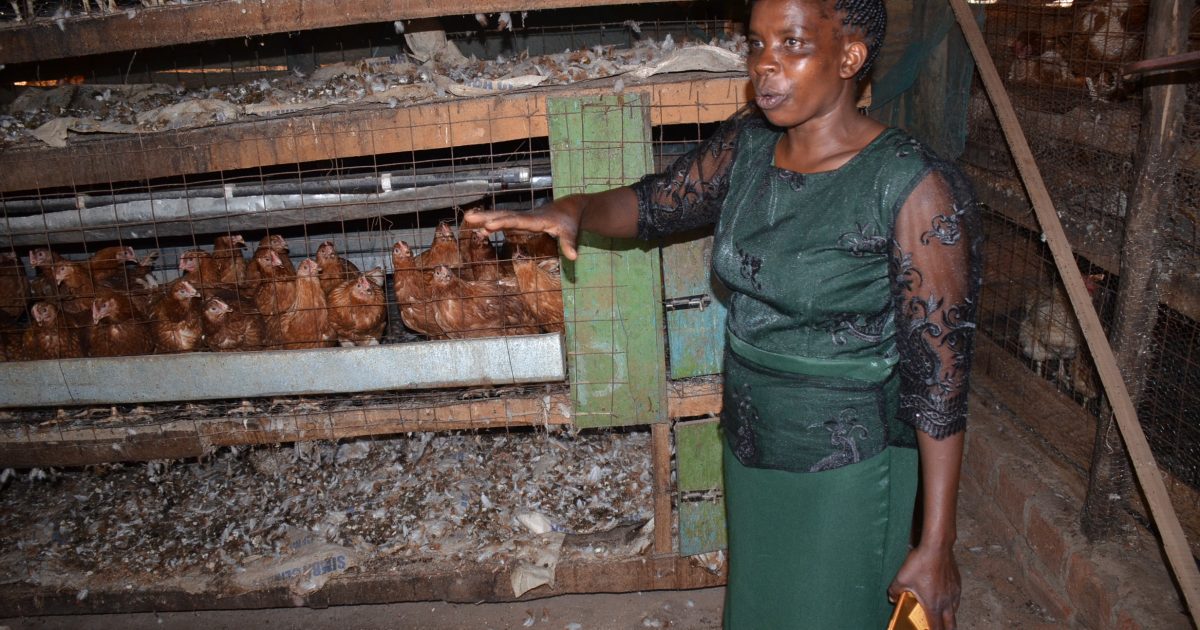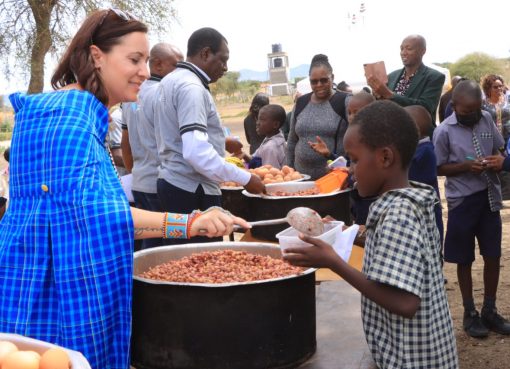
On a given day in her poultry business, Mrs. Pacifica Ombachi could get up to Sh. 4,000 in a day. She would sell at least 10 trays of eggs and chicken to various customers. Her business boomed and for the seven years she has been in the business, buying feeds for her layers and making profits is what she enjoyed most.
As a housewife, she enjoyed doing business that could put food on the table for her children and do her development with ease. The market for her produce was readily available until March this year when corona virus knocked on the doors of Kenya and Trans Nzoia.
Her main market was customers with events such as funerals, weddings, family get together and other social events. According to Mrs. Ombachi on a given weekend, she would sale as many as 200 chickens to residents holding funerals.
This is where her main market was. “I used to sell and get like sh. 20,000 in one good weekend,” she told KNA during an interview in her home in Mail Saba. She said her orders on chicks was on weekly basis and had chicken of all sizes at a given time. Her customers knew that she their orders were as appropriate as they needed it. I had chicken of all stages ranging from one day to three months.
Her other market was customers selling eggs to lovers of the beer. She says these particular customers would buy as many as ten trays in a given day and would enable her get like sh. 3000 per day. She was selling the tray at sh. 300. I also used to sell to shops and hotels and would get hard cash every day from my sale of eggs. Her neighbours were also a good doorstep market.
During this time, Mrs. Ombachi would buy chicken feeds with ease and profits enabled her to run her home with minimum difficulties. The profits also enabled me expand my business from 200 chickens per week to 500 hundred weekly.
“What I can say is that I really enjoyed rearing chicken and droppings from the poultry enabled me to venture into horticulture,” she said. The manure enabled her to plant vegetables which she sold to people at Mail Saba centre that earned her another shilling.
Her income was stable following the readily available market and the theory of demand and supply worked for her. The manure also made her get good harvests in bananas. “I was doing quite well until covid-19 came in,” she said.
She said that she would sometimes import chicken feeds from Uganda at a cheaper price. A bag of 50 kg in Uganda of layers feeds was going at sh. 1,500. This made her to save on feeds given that the Kenyan chicken feeds were selling at sh. 2,300 per 50 kg.
Mrs. Ombachi like any other Kenyan received the news of the virus with disbelief. She feared the deadly disease that had claimed many people across the world was a threat to her life and that of the family. She didn’t know that apart from threatening life, her business was also going to be affected.
When the first case on Covid-19 was announced to Kenyans on March 12, 2020 many Kenyans looked at it as a disease far from them with unprecedented expectations. Like any other Kenyan, Mrs. Ombachi didn’t imagine that the movement controls were immediately going to affect her market. With her buyers being under movement control measures, her prices of both chicken meat and eggs has been adversely affected.
The movement controls led to closure of hotels and bars besides ban on social gathering to observe social distance. The social distancing put to end crowds at the funerals, parties and weddings. Many people kept off social gatherings and preferred to support affected families through Mpesa transactions.
This changed the way people interacted and celebrated either their departed. The government regulations on funerals were 15 people. Part of government guidelines was discouraging mourners from eating at funeral. This adversely affected the market for chicken farmers who majorly relied on this crowds to vend their produce. Merry making came to a halt meaning that the chicken did not have meaning in such social gatherings.
To Mrs. Ombach and other farmers in Trans Nzoia, it meant incurring upkeep expenses for the mature chicken. She says that everything came to a standstill. She would no longer feed her chicken that had been enclosed. She choose to allow them be like their traditional ones and went for free range. I thought by doing this I will save on the up keep.
The free range had its own disadvantages. By the second week of free range, she had lost 20 birds to stray dogs within her neigbourhood. The chickens also were prone to disease and she ended up spending a lot of money treating them.
The few that survived still had no market. Buyers now wanted to get a chicken at half the price. I have been forced to sale a chicken that I was initially selling at sh. 1500 to almost Sh750. it was devastating. As a farmer this has been my worst moments. When Uganda also closed its borders, it meant going for the locally available feeds that are expensive.
She eventually stopped ordering for new chicks. The 400 layers cannot sustain themselves. “Before corona knocked on our doors I was selling a tray of eggs at sh. 300, today buyers want it at Sh 250. In fact there was a time I sold the eggs at sh. 200 a tray,” she said.
The poultry value chains were all affected with populations facing shrinking incomes. . Ombachi has accepted new realities with a lot of pain. She hopes that with the government relaxing control measures, market may resume to give back her incomes.
By Pauline Ikanda





